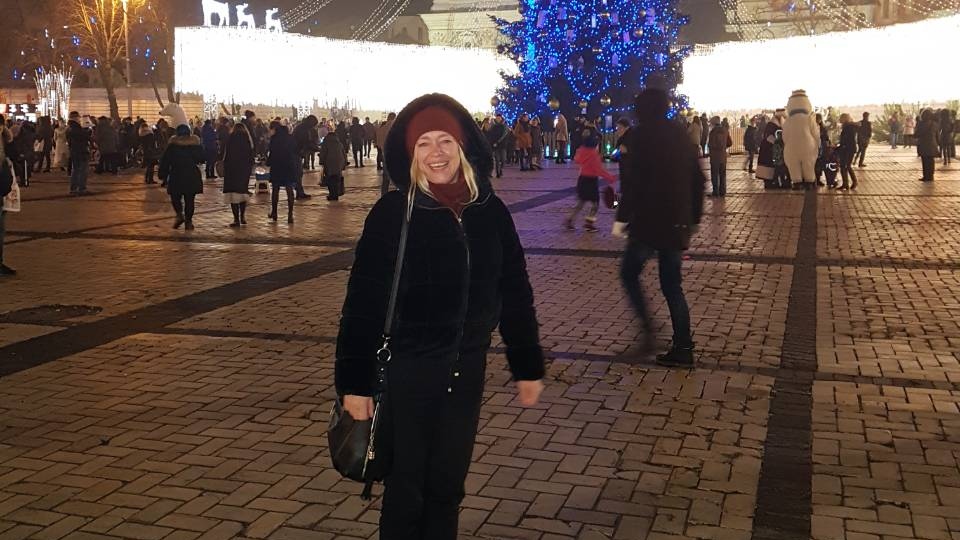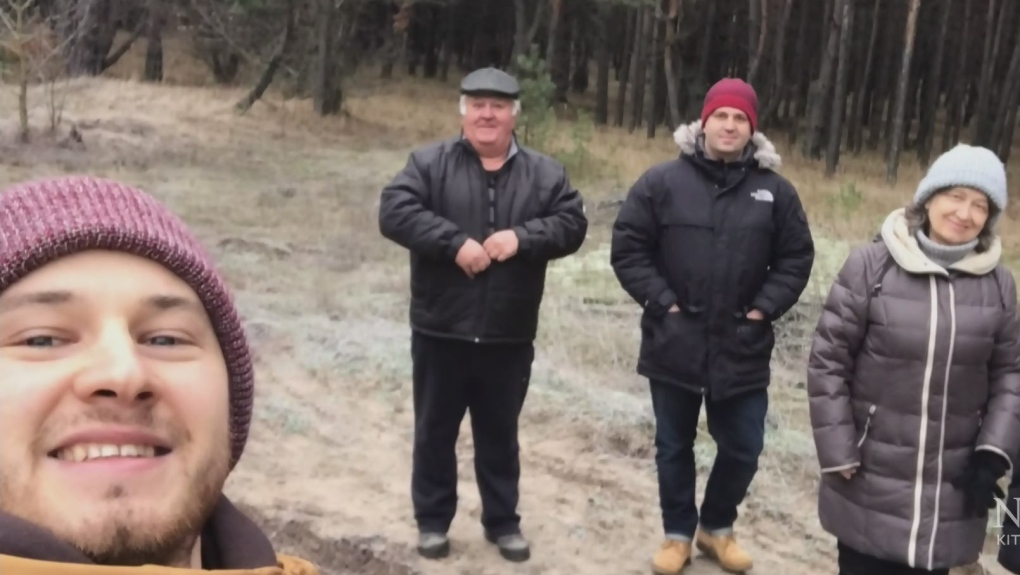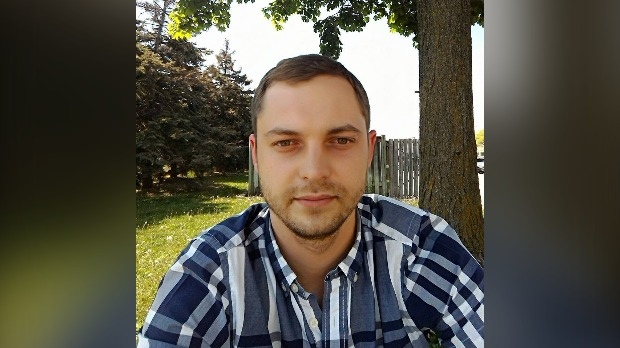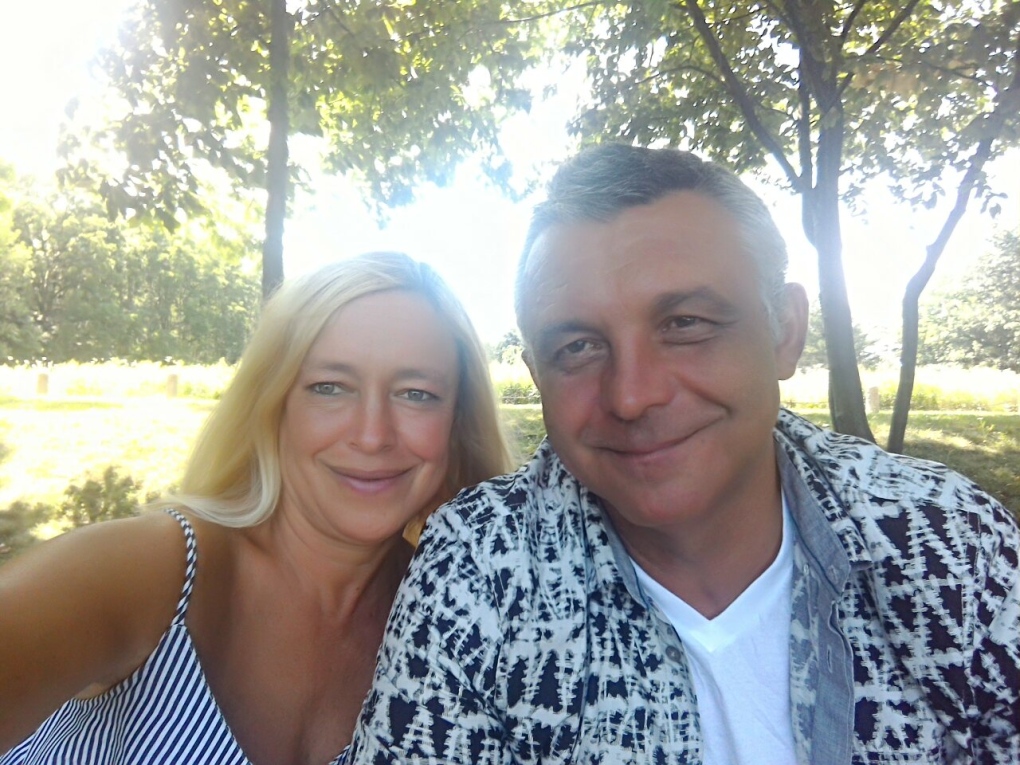'A text message once a day saying 'we are alive': Ukrainians in Waterloo Region worry for family unable to leave home country
With roughly 8,000 km separating Waterloo Region from Ukraine, locals with family in the war-torn country watch what’s happening there with both fear and faith.
Waterloo resident, Igor Shvets was born in Kiev, Ukraine and immigrated to Canada in 2004. His mother is still back home.
“She hears gunfire, gunshots every night,” said Shvets. “Sometimes they are very close. Sometimes they are far away.”
His mother is staying in Ukraine because she is the caretaker for his elderly grandmother.
“They want to leave, but it’s very hard for my mom to do that because my grandma is not very mobile.”
 Waterloo resident Igor Shvets' mother, seen here, is in Kiev, Ukraine caring for his grandmother. (Submitted/Igor Shvets)
Waterloo resident Igor Shvets' mother, seen here, is in Kiev, Ukraine caring for his grandmother. (Submitted/Igor Shvets)
Shvets says he is doing what he can to bring them to safety.
“We did apply to the Canadian government for a visitor visa and we are waiting for it to be processed,” Shvet said.
Kitchener resident, Andriy is in a very similar situation. Andriy did not want us to share his last name out of fear for his families’ safety back home.
He was born in Kharkiv and immigrated to Canada in 2014.
Andriy says his aunt and cousins were able to make it across the border to safety. Their trip to the border that would normally take one day, took three.
However, his father and uncle remain in Ukraine, choosing to stay and care for his grandmother.
“It’s impossible for them to leave because of my grandmother. She’s old and she is not mobile,” Andriy explained.
“They care about their mother, they stay to take care,” he added.
 Andriy and family. (Submitted/Andriy)
Andriy and family. (Submitted/Andriy)
Andriy says his father, uncle and grandmother are currently sheltering in a basement that they are sharing with neighbors. They are without electricity and are using a generator to charge their phones.
“To be able to send me a text message once a day saying ‘we are alive’ they have to go to the roof of the building,” Andriy explained. “The connection is very weak because some of the towers were destroyed."
It scares him that his father must travel to the roof because, “bombings happen several times a day.”
“There is also no heating because the gas line was destroyed by the Russian rocket,” Andriy explained. "It’s currently winter in Ukraine and current temperatures are similar to Ontario."
 Igor Shvets. (Submitted)
Igor Shvets. (Submitted)
For Shvets, his mother and grandmother have been contacting him by telephone. They still have electricity in their apartment unit, “but tomorrow they might not,” he said.
The two families do not know each other, but are both tormented by the war and are praying for a ceasefire to be honoured.
Andriy says that would give civilians a safe corridor for travel, especially ones who have medical conditions like the elderly and sick.
“What happened in my city, Russian rockets destroyed pretty much every hospital in the city,” Andriy said recalling a story he was told about limited medication for those in need.
“One of my friends mother-in-law, she has cancer and she is not mobile as well and she wasn’t able to get painkillers even. She was suffering so much.” Andriy explained.
“One of our army’s soldiers gave up his medical kit of painkillers to just help and that’s one way our army supports our citizens,” Andriy said.
Shvets says that right now, his grandmother does have the medication she needs. He is trying to prioritize a way out for them.
“It’s best to go to Poland, but we cannot go to Poland,” Shvets said. “Because my mother cannot carry my grandma... and we don't have a car so they can’t really leave on their own.”
Even for civilians who do have access to a vehicle, the roads out are not easy to access.
“Most roads are destroyed already, and also some of them, they have mines,” Andriy said.
With limited communication both men live each day without knowning if or when they will hear from their loved ones next.
“He's still positive,” Andriy said about his father.
“I don’t say 'good morning' anymore I just say 'morning,'” Andriy added with hesitancy, scared of adding a positive spin to what may not actually be a good morning.
Then every time his father answers, there is a sigh of relief.
“He says ‘good morning, I am alive' and I am so happy every time I [read] that,” said Andriy.
Andriy says his father, uncle and grandmother are “looking to stay home as long as they can.”
 Igor Shvets' mother and father. (Submitted/Igor Shvets)
Igor Shvets' mother and father. (Submitted/Igor Shvets)
Shvets is still waiting for his family to have the first part of their visa application reviewed. He says at that point they will try and find some sort of transportation to any neighbouring country that will help them.
“They are constantly shooting at civilians and all of these ceasefires are being violated so I don’t feel safe sending my mom there,” Shvets said in reference to what could be a risky drive to the boarder.
He adding that a ceasefire may be the only way they can safely travel there.
“The whole world should just wake up and work together,” Shvets said, asking his fellow Canadians to write to their MPs and encourage Canada and other countries to create a no-fly zone over Ukraine.
“Mainly right now, people need weapons and they need humanitarian aid,” Shvets added, “a lot of innocent people are dying.”
According to Andriy, “The best pressure is economic pressure.”
If your business has business with Russia,” Andriy said. “Stop it.”
CTVNews.ca Top Stories

Felonies, assassination attempts and a last-minute change on the ticket leads voters to Tuesday's U.S. election
A campaign that has careened through a felony trial, incumbent being pushed off the ticket and assassination attempts comes down to Election Day on Tuesday.
Elections BC says box of 861 votes uncounted, others votes unreported
Elections BC says it has discovered that a ballot box containing 861 votes wasn't counted in the recent provincial election, as well as other mistakes including 14 votes going unreported in a crucial riding narrowly won by the NDP.
Peel police officer suspended after video appeared to show him at protest while off duty
Peel police say four people were arrested and an officer was injured following several protests in Mississauga and Brampton Sunday afternoon, including one at a Hindu temple that turned violent.
Canadians prefer Trudeau work with Harris, Poilievre with Trump: Angus Reid
As Americans prepare to elect their next president on Tuesday, new data from the Angus Reid Institute suggests Canadians hold differing views as to which federal party leaders would be best suited to deal with either Donald Trump or Kamala Harris.
Surprise swing state? Iowa poll has Harris suddenly leading
Based on victories in the past two elections and polls leading up to Tuesday’s election, Donald Trump had seemed almost certain to win Iowa, but a new poll has Kamala Harris with a sudden three-point lead.
Russia suspected of sending incendiary devices on US- and Canada-bound planes, Wall Street Journal reports
Incendiary devices that ignited in Germany and the United Kingdom in July were part of a covert Russian operation that aimed to start fires aboard cargo and passenger flights heading to the U.S. and Canada, the Wall Street Journal (WSJ) reported Monday, citing Western security officials.
Months after VRBO booking, Taylor Swift fan told home 'not available' during Vancouver concert
A frustrated Taylor Swift fan is speaking out after being pushed from a short-term rental she booked for the upcoming Vancouver leg of the superstar’s Eras Tour.
3 arrested as protesters clash outside Hindu temple in Surrey, B.C.
Three people were arrested after duelling protests erupted into violence outside a Hindu temple in Surrey, B.C., over the weekend, according to the RCMP.
Musk PAC tells Philadelphia judge the US$1M sweepstakes winners are not chosen by chance
A lawyer for Elon Musk 's political action committee told a judge in Philadelphia on Monday that so-called 'winners' of his US$1 million-a-day voter sweepstakes in swing states are not chosen by chance but are instead chosen to be paid 'spokespeople' for the group.

































